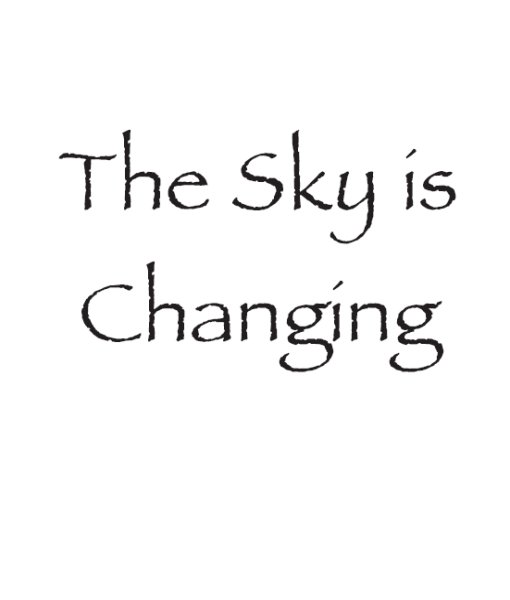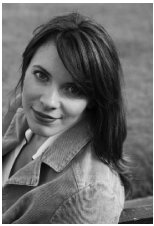The Sky is Changing




Legend Press Ltd, 2 London Wall Buildings,
London EC2M 5UU
[email protected]
www.legendpress.co.uk
Contents © Zoë Jenny 2010
The right of the above author to be identified as the author of
this work has be asserted in accordance with the
Copyright, Designs and Patent Act 1988.
British Library Cataloguing in Publication Data available.
ISBN 978-1-9065581-7-8
All characters, other than those clearly in the public domain, and
place names, other than those well-established such as towns and
cities, are fictitious and any resemblance is purely coincidental.
Set in Times
Printed by J. H. Haynes and Co. Ltd., Sparkford.
Cover designed by Gudrun Jobst
www.yotedesign.com
All rights reserved. No part of this publication may be
reproduced, stored in or introduced into a retrieval system, or transmitted,
in any form, or by any means electronic, mechanical, photocopying,
recording or otherwise, without the prior permission of the
publisher. Any person who commits any unauthorised act in relation
to this publication may be liable to criminal prosecution
and civil claims for damages.

Selected other works by Zoë Jenny
The Pollen Room
The Call of The Conch Shell
A Fast Life
The Portrait
The Pollen Room is the all-time bestselling
debut novel by a Swiss author and
has been translated into 27 languages. This
is Zoë Jenny's first novel written in English.
Praise for Zoë Jenny
âIn her apartment in Basel's old town, however, wearing earplugs to block out the noise of the trams and with sheaves of writing paper at her side, she achieved something momentous: writing by hand, she composed a 134-page novel that has become the talk of Swiss literary circles.'
NEW YORK TIMES
âAs Jo's child's eye narration covers everything from a haircut to an abortion in the same mesmeric deadpan style, it soon becomes apparent that this is not so much a narrative as a portrait of a state of mind in extremis... At times reminiscent of both Plath and Hemingway â a memorable debut.'
SUNDAY TIMES
âZoë Jenny's account of a marriage break-up is both barmy and believable and her words are an exciting mish-mash of dreamy images and reminding realism.'
THE TIMES
âThe story of a psyche, but one unadorned by selfconscious or analytical comment, mediated through poetic detail and precise, concrete images. The prose is spare, assured and evocative, the tone matter-of-fact and utterly without self-pity... There's an undertow of danger lurking beneath the surface which makes you want to re-read this intriguing, haunting novel as soon as you've finished it.'
OBSERVER
âA moving account of a disturbed childhood, and the prose works many of its best effects through understatement and absences.'
SUNDAY TELEGRAPH
CONTENTS

Zoë Jenny's first novel
The
Pollen Room
was the all-time bestselling debut by a Swiss author. Translated into 27 languages, it has won huge critical acclaim worldwide. Her published novels since include,
The Call of the Conch Shell
,
A
Fast Life
and
The Portrait
and Zoë Jenny is widely regarded as one of the best writers of her generation.
With
The Sky is Changing
her first novel to be written in English, she has become one of the first writers to create original fiction in more than one language.
Zoë Jenny was born in Basel, Switzerland, in 1974. After years of travelling and living in New York and Berlin, she has now settled in London.
For Matthew
*
The rosebush was already there when they moved in. Someone must have planted it many years ago; perhaps it had only been a little plant back then and the person who put it in the earth never had the chance to see it in full bloom. Intertwined with the passionflower, the roses had climbed up and covered almost half of the brick wall at the back of the garden. The scarlet and purple flowers were so vibrant, it surprised Claire that something so beautiful was able to grow in this little dark backyard, and she couldn't help but hesitate before she snipped off a bunch of roses with the secateurs. There was something sacrilegous about it, like when she had taken that glorious orchid while on a walk, which had then wilted by the time they got home. Why did she have to take it; wasn't it enough just to look at it? But this time, the flowers weren't for herself.
Claire looked up into the bright blue sky and followed the white jetstream of a plane leaving London. How quickly this year had passed, she thought. How good the world was at looking normal and concealing its tragedies.
“Let's go,” Anthony shouted from inside the kitchen. “I haven't got all day!”
Claire smiled as she knew that while it sounded as if he had something very important to do, he just wanted to be back in time for the match.
“You don't have to come, you know. I can go by myself,” she said. He didn't even answer, just rushing out of the house instead.
It was a hot, humid day. City Road was jammed with traffic and a line of buses moved sluggishly forward, like a herd of ancient animals slowly dying in the sun.
“Don't you want to try again?” Anthony asked tentatively when they reached Upper Street, Angel Tube station just a few steps away. “It's only one single stop to King's Cross, you know.”
Claire shook her head.
“You don't want me to have a heart attack, do you?”
It happened shortly after the bombings a year ago, somewhere on the Northern Line. It was rush hour, and Claire had found herself pushed to the back of the carriage, unable to move. People were swaying with every turn, and she could feel the cumulative weight of the passengers smothering her. Her heart was racing in her chest so hard it was as if a living creature was trying to get out. âCalm down, for God's sake,' she had said to herself, but her heart just went faster. The noise of creaking metal and rattling wheels cutting through the darkness at high speed gave her a drowning sensation. Staring at the door and counting the seconds, she remembered the expression: âsoft target'. She could die here with all these strangers, in an instant, just like that. The fear and aggression in the air was almost palpable; everyone on survival. Suddenly something inside her changed, a sudden diffusion of chemicals in her brain. She had to get out of there, right then.
With both her elbows she pushed people aside. Someone swore at her, “Stupid bitch”, but she didn't care, she was someone else now, brutish, raw, animallike. She would have punched anyone who dared to stand in her way. These weren't people anymore, just obstacles, stinking, hateful flesh.
When Claire had finally emerged from the Tube, stepping into the daylight, she was covered in sweat and out of breath, her mouth dry. Stumbling into the toilet of a nearby Starbucks, she looked at her face in the mirror: it wasn't just pale, it was as white as a sheet. Her knees weak and shaky, completely exhausted, she sat on the lid of the toilet seat to recover. She propped her head in her hands, ashamed of herself; she couldn't believe that she had behaved like that. For a brief moment she had actually lost her mind.
After that incident Claire had decided to never, ever go down there again and was relieved that Anthony didn't insist on using the Tube. Even though he was convinced it was just one of her fads that would be forgotten with time, he had bought her a scooter as a gift.
Pentonville Road was a long stretch, and Claire carried the flowers head down so they wouldn't wilt as quickly in the heat. Anthony checked his BlackBerry and there was a Happy Birthday greeting from his mother. He read it somewhat disappointed, as if he had expected it to be from someone else. Claire felt sorry for him, that they had to do this on his birthday
â that this day was a day of grief for so many.
She could see other people with flowers now, someone even carrying a giant teddy bear under his arm. A large crowd had gathered just a few metres to the right of King's Cross station entrance. There was a little square behind some railings with a tree in the middle, at night a seedy place where drug dealers and prostitutes hang out.
Now there were dozens of people creating a temporary memorial, and Anthony and Claire joined the queue, waiting for their turn. A security guard made sure that not everyone went in at once. Policemen were protecting the site, batons and guns at the ready. Most people just laid down their flowers and left, but some were kneeling in front of a photograph or wreath, praying.
Even though King's Cross was a busy, noisy spot, on this particular day there was a strange silence, interrupted only by announcements from the loudspeakers inside the station. Claire was looking at the photographs and children's drawings. There were flowers everywhere, some still wrapped in foil, sweating away in the sun, releasing their sweet, heavy scent. The smell of death, Claire thought, and she laid the roses next to a photograph mounted on a piece of cardboard. It showed a young girl with short blond hair. Underneath, in big red letters, was written âWhy?'
